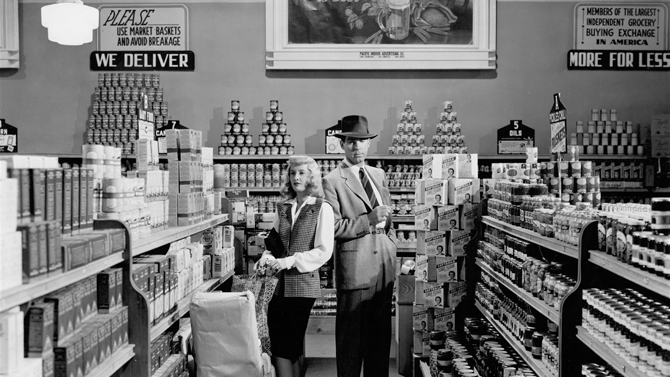One of my favourite genres is the short-lived film noir category, which lasted through the 1940’s and petered out towards the end of the 1950’s. It grew from the German expressionism period of the 1920’s and was compounded by the anxiety and cynicism that came out of World War II. Named by French critics who were describing the black-and-white Hollywood crime movies of the 40’s, this is a unique genre that captures a much darker, cynical and more vicious world than most other films from this period.
Many of these movies are set during the steamy and sweltering heat waves of Los Angeles and there is no better time to watch them than on a hot summer’s night. I will be reviewing a few motion pictures from this genre in the next few months and the first movie that I will discuss is one of the great, if not the quintessential film noir, Billy Wilder’s 1944 masterpiece Double Indemnity.
Written by Wilder himself, along with famed novelist Raymond Chandler and based on James M. Cain’s novel (he also wrote the novel for another classic film noir: The Postman Always Rings Twice), the movie begins with our wounded and (as we will soon find out) flawed lead as he recounts his story into a Dictaphone (the off screen first-person narration is used in several film noir pictures and is done with great effect here).
Through flashbacks we see the events which lead to our narrator’s present circumstances. Walter Neff, played by usual nice guy Fred MacMurray, is an insurance agent for the Pacific All Risk Insurance Co. He drops in to renew a client’s insurance and happens to meet his wife, the seductive femme fatale Phyllis Dietrichson (Barbara Stanwyck) and falls for her. They start having an affair and the couple soon devise a scheme to off her husband in an unlikely way, in this case falling off a moving train, which will activate the ‘accidental’ double indemnity clause that will pay Dietrichson twice the amount of the claim. The two meet regularly in a supermarket to plan the murder.
The complex scheme seems to go smoothly enough, with Neff pretending to be Mr. Dietrichson in a leg cast. He makes sure he is spotted and lets another passenger know where he is going, and then jumps off the train with no witnesses. The pair leave the real deceased body of Dietrichson on the tracks and hop into their car to escape. As you have probably seen before, when they jump into the car to get away, it will not start. This seems like a redundant stunt that has been used ad nauseam to build suspense in many movies over the years, but this was actually the first time that device was ever used on film, so it was very original indeed.
Everyone accepts the accidental death story, including Neff’s best friend, insurance analyst Barton Keyes (Edward G. Robinson), until the ‘little man’ inside his chest keeps telling him that something is not quite right with the case. He eventually suspects another man must have helped Dietrichson kill her husband and Neff begins to feel the pressure.
Some of the key elements of film noir are the attempt at a perfect crime, the femme fatale, love, sex, murder, and conspiracy as well as betrayal; Double Indemnity melds all of these elements together beautifully to create a memorable experience. Wilder and his team create a stunningly visual film, a perfect example of this being the climactic final meeting between the two lovers. Subtle light seeps through the Venetian blinds, creating a feeling of entrapment that only a black-and-white motion picture can give.
The actors are also excellent. MacMurray is perfect as he walks the line between the nice guy that he is so known for playing and the conniving adulterer he is in the movie. Stanwyck is amazing as the stunning femme fatale, whose beautiful exterior blinds us to her evil interior. Robinson is extremely entertaining as the fast talking and quick thinking insurance analyst. The triumvirate aid in elevating this motion picture to the classic it has become.
The dialogue must also be mentioned. Though some may disagree, sometimes there is nothing better than listening to the hard-boiled dialogue of this era. One of my favourite lines of all-time comes after the plan has gone smoothly and Neff says in voice-over: “suddenly it came over me that everything would go wrong. It sounds crazy Keyes, but it’s true so help me: I couldn’t hear my own footsteps. It was the walk of a dead man.” An eerie and spine-chilling line.
Billy Wilder’s Double Indemnity is an excellent film that showcases the elements of the film noir genre. From deceit and conspiracy to illicit love affairs and murder, this movie will show that not every embrace is a loving one and as Keyes predicts “murder is never perfect”.

